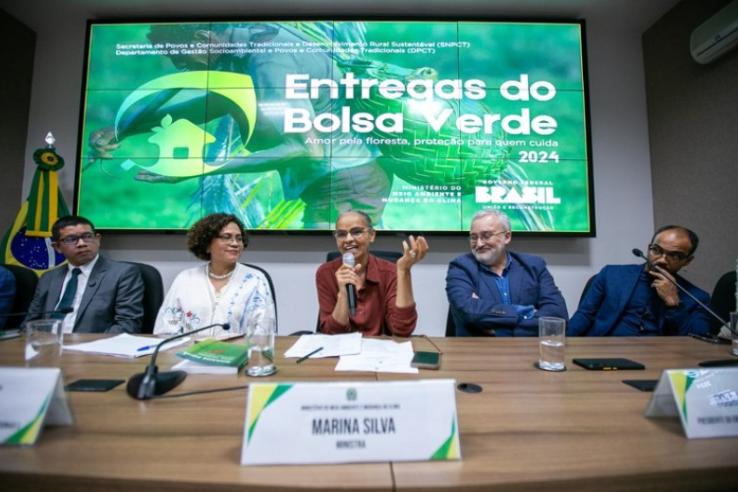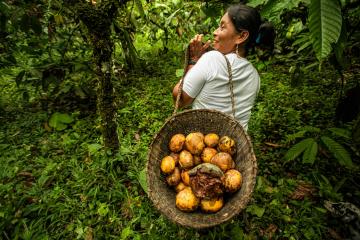
Integrating conservation into development policy in Brazil

The environment is at the heart of global discussions, vital for sustainable development and addressing the 21st century challenges. In Brazil—one of the world's most biodiverse countries and a key player in the fight against climate change—the environmental agenda is not only an ethical obligation but also an opportunity for strategic economic development.
In this context, public policies that integrate environmental conservation with income generation can help in reducing social inequalities. While individual behavior and corporate commitments play an important role in transitioning to a sustainable economic development model, the structural changes needed to mitigate environmental impacts can also be effectively achieved through well-designed public policies.
The partnership between the Secretariat for Public Policy Monitoring and Evaluation and Economic Affairs (SMA) of the Brazilian Ministry of Planning and Budget and J-PAL Latin America and the Caribbean (LAC), as part of our Government Partnerships Expansion in Brazil and Mexico, is an example of a strategic collaboration model for implementing evidence-based environmental policies. The primary goal of this partnership is to (re)design and implement an impact evaluation of the Bolsa Verde Program.
Payment for Ecosystem Services (PES) policies, such as Bolsa Verde, can play a crucial role in promoting environmental conservation by providing financial incentives for sustainable practices. Randomized evaluations of PES programs have found that they can help reduce deforestation, improve air and water quality, while promoting social inclusion and supporting vulnerable populations.
The Bolsa Verde Program was launched by the Brazilian federal government in 2011 and is coordinated by the Ministry of the Environment and Climate Change (MMA). Relaunched in 2023, the redesigned program aims to support families living in extreme poverty within designated conservation areas such as national forests and sustainable development regions, and in territories occupied by traditional communities, including populações ribeirinhas (riverside populations), Indigenous peoples, and quilombolas (settlements of Afro-Brazilians who are descended from enslaved people).
By integrating environmental protection with social protection, the program seeks to curb deforestation, conserve ecosystems, and mitigate the impacts of climate change. Additionally, by providing conditional cash transfers and capacity building for sustainable development, Bolsa Verde intends to improve the well-being of beneficiary communities, strengthen local economies, and promote economic equity.
In light of these ambitious goals, SMA and J-PAL LAC are working together to rigorously assess whether cash transfers to Bolsa Verde participants can serve as an effective strategy to reduce deforestation, encouraging a shift from environmentally harmful activities to lower-impact practices. In October 2024, the Bolsa Verde Program’s Monitoring and Evaluation Plan was completed. It is the first product of this partnership, developed in collaboration with the Climate Policy Initiative at Pontificia Universidade Católica-Rio.
The plan describes how the program intends to achieve its objectives and the indicators to monitor its implementation and results. It also includes qualitative and quantitative studies to analyze environmental, social, and economic impacts, addressing challenges such as data gaps and the need for inter-institutional coordination, while proposing evaluation strategies to identify potential causal impacts.
J-PAL LAC has also collaborated with SMA in developing the Executive Evaluation of Policies for Preventing and Combating Illegal Deforestation in Brazil, under the Public Policy Monitoring and Evaluation Council (CMAP). This effort involved gathering evidence on the impact of deforestation policies across different biomes, including the Amazon and the Cerrado, an ecoregion of tropical savannah in central Brazil.
In 2025, the second year of the partnership, planned activities include conducting an impact evaluation of Bolsa Verde and strengthening the Ministry of the Environment’s monitoring and evaluation systems. This will involve supporting SMA in enhancing processes that promote a culture of innovation and the rigorous use of evidence. This project will run concurrently with the pilot implementation of SMA's Standardized Public Policy Evaluation Methodology (MAPP) tool.
The partnership between SMA and J-PAL LAC marks a significant step toward evidence-based environmental policymaking, demonstrating that conservation and social inclusion can go hand in hand. It also highlights the power of structured, evidence-driven collaborations to address 21st-century environmental challenges and promote a sustainable development model that protects vulnerable territories and communities. Sustaining these efforts will be crucial for positioning Brazil as a global leader in climate action and biodiversity conservation.



